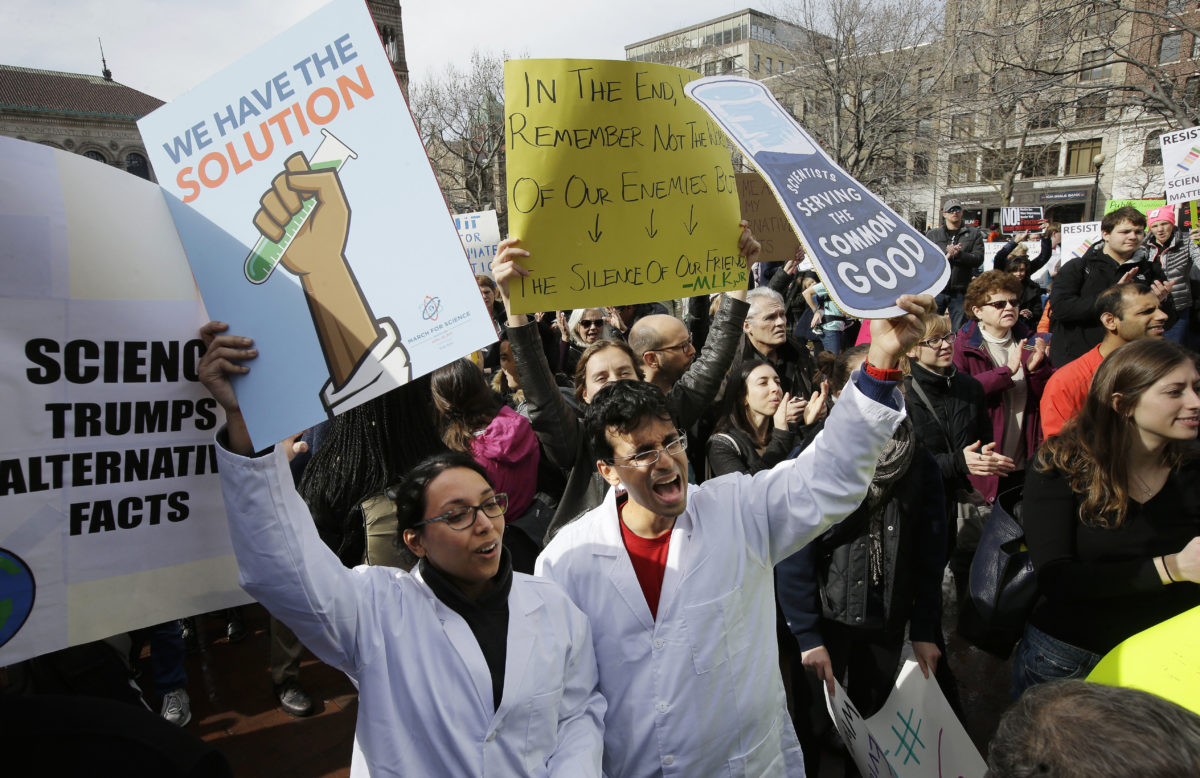Atlanta March For Science Organizers Hope To Start A Movement

Steven Senne / Associated Press
March for Science organizers in Atlanta are preparing for thousands of people to turn out this Saturday in a movement that’s coalesced since President Donald Trump’s inauguration.
The main march is in Washington, D.C., but like the Women’s March in January, satellite events are happening all over the country. Here, people are gathering in Candler Park to hear speakers, to march, and to express their support for what they say should be a non-partisan issue: science.
Organizers of the march say their message really isn’t political. But they are motivated by concerns about the Trump administration and policy changes.
The director of the Atlanta march, Jasmine Clark, a microbiologist who teaches at Emory and Georgia State said that, like many participants in the march, she’s new to activism.
“Prior to Nov. 8, I was a yell-at-the-TV activist. After Nov. 9, I kind of woke up,” Clark said.
The new administration’s stance on climate change especially alarmed her.
“It’s really sad to me that climate change — whether or not it’s happening and man-made — is a partisan issue,” she said. “And honestly, it doesn’t matter if you’re a Democrat or a Republican. It doesn’t matter who you vote for, because it’s affecting all of us.
Critics of the march have said that science should not be politicized, but Clark said it already has been.
“We’re not here to politicize it; the politics came to us,” Clark said.
Hundreds of people turned out to an initial planning meeting for the Atlanta march in January; organizers of that event had initially expected maybe a couple dozen. Now, there are committees, printed t-shirts, banners, and a planned event that will include a stage, speakers, vendors, chants and a route through Candler Park and Little Five Points.
Activism is new to some of the organizers, like Clark, but others have worked on other causes. Benny Villegas, a masters student in software engineering at Kennesaw State University said he’s been involved in activism before, as an undergraduate at UGA with the Hispanic Student Association. There, he advocated for DREAMers, students who came to the U.S. as children illegally, and have been allowed to stay in the country under a program created by President Obama.
“My mom raised me that, if you see someone struggling, if you can help them, do it. If you can’t, at least don’t leave them in a worse position than they are,” he said. Now, he said, he’s applying that to science and to scientists, which he sees as being denigrated by the new administration. “I want to live in a society where we exchange strategies and we discover together. If we do not stand up against the forces that impede that, we are just destroying ourselves as humans, as intellectuals.”
The idea of the march has also started conversations within the scientific community, said Nadia Lelutiu, another organizer, who is a research laboratory manager at Emory.
“I’ve gotten to hear from these senior scientists who I admire and adore, who have a lifetime of achievement of work in science, about how they view the role of science in politics and in public health and in society at large,” she said. “It would have never come up had this march not been organized.”
It’s a conversation that March for Science planners hope to keep up after the march itself, within the scientific community, and also outside of it.
“One of our volunteers tagged the line, ‘A movement in motion stays in motion,’” said Atlanta march director Clark, adapting a scientific law for an advocacy goal. “This is the beginning of our movement.”
9(MDAxODM0MDY4MDEyMTY4NDA3MzI3YjkzMw004))







